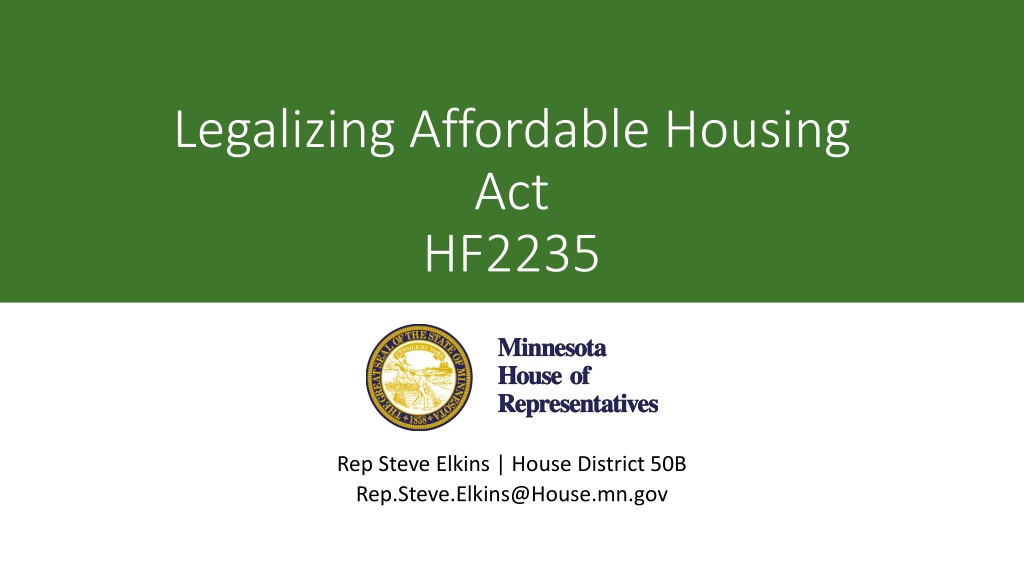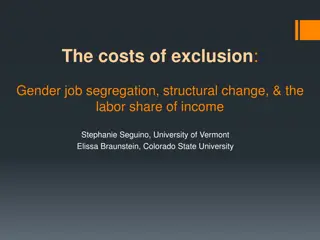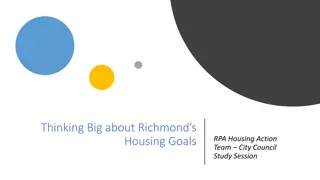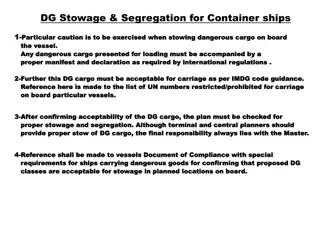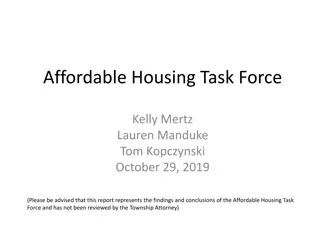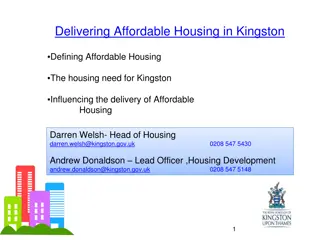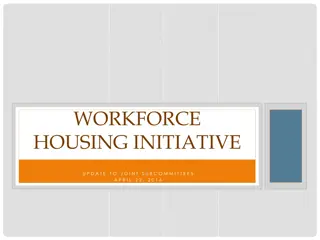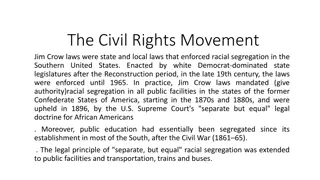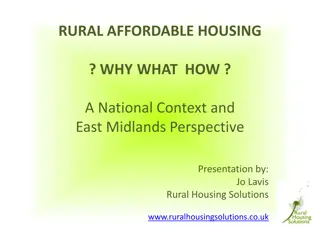Minnesota Housing Reform: Addressing Segregation and Affordable Housing Challenges
This content covers various aspects of housing reform in Minnesota, ranging from the Legalizing Affordable Housing Act HF2235, addressing Twin Cities housing segregation, challenges faced by cities in recovering infrastructure costs, and proposed reforms like enabling development impact fees and environmental review adjustments to promote affordable housing. It also delves into the local control issue and proposed planning & zoning reforms to increase affordable housing options in metro areas.
Download Presentation

Please find below an Image/Link to download the presentation.
The content on the website is provided AS IS for your information and personal use only. It may not be sold, licensed, or shared on other websites without obtaining consent from the author. Download presentation by click this link. If you encounter any issues during the download, it is possible that the publisher has removed the file from their server.
E N D
Presentation Transcript
Legalizing Affordable Housing Act HF2235 Rep Steve Elkins | House District 50B Rep.Steve.Elkins@House.mn.gov
How Twin Cities housing rules keep the metro segregated Cover picture for the front page Star Tribune article entitled "How Twin Cities housing rules keep the metro segregated". The picture is an aerial view looking down on a neighborhood of single family homes.
Flaming Hoops Diagram Description automatically generated with medium confidence Basic Premise: Because Cities are not allowed to assess cost-based development impact fees to recover their infrastructure costs, directly, they use a variety of fees and zoning restrictions to slow development and recover their costs, indirectly. Cities will not increase property taxes on existing taxpayers to fund new housing development that existing residents don t even want.
Article 1: Development Impact Fees Enables local governments to assess benefiting property owners for the cost of building infrastructure that prepares their land for development.
Article 2: Environmental Review This article prevents NIMBY groups from using Minnesota s Environmental laws (MERA) to challenge city comprehensive plans that promote affordable housing.
Addressing the Local Control Issue Minnesota is a Dillon s Rule State Cities have the authorities granted to them by the State The zoning and planning authorities granted to Cities are described in two chapters of State law: 462 (Statewide Zoning and Planning) 473 (Metropolitan Land Planning Act) These chapters of State law were last reformed in 1995
Article 3: Planning & Zoning Reforms These changes reinstate the intent of the 1995 Reforms Comp Plan/Zoning Conformance is defined for the first time Discrepancies must be resolved by conforming the zoning to the comp plan if it has not already been done by the time a development proposal has been received Development moratoriums may not be applied retroactively after a development proposal is received Only land that has been both guided and zoned for affordable housing counts towards a metro city s Livable Communities grant program qualification goal.
Article 4: Limiting Regulations on Development Cities may not ban modular apartment buildings Duplexes or ADUs may be built in single-family districts Planned Unit Development process my not be imposed Purely aesthetic mandates are prohibited Multi-car garages may not be required Minimum home (or garage) sizes may not be required
Article 5: Municipal Dedication Fees Park Dedication Fees/Dedications capped at 10% Excessive dedications of land for roads is prohibited The uses of dedication fees must be tracked/reported
Article 6: Planning Densities In newly developing areas of the Twin Cities Planned average densities must be at least 4 units/acre At least a quarter of the land planned for single family housing must allow up to 8 units per acre (small lots or duplexes) Developers can develop at lower densities, but they cannot be required to do so. Planned rural land must allow densities of no more than 1 unit per 10 acres (to enable efficient subdivision when the land is ripe for development)
Article 7: Sewer Availability Charges (SAC) SAC charges must be charged on the basis on no less than 4 units per acre. A home built on a acre lot would be assessed 2 SAC charges
Article 8: Building Permit Deadlines If a building permit application is not acted upon within 60 days, the city must refund the building permit fee after the application has been processed. The 60 days does not begin until the application is complete, and the city has all the information required to process the request.
Article 9: Building Permit Fees The Dept of Labor & Industry will provide and maintain a standard methodology for estimating home values against which building fees are assessed. Building fees are assessed based upon the estimated value of the completed home. This provision is included (along with Article 11) in HF2283
Article 11: Building Permit Fees Raises the reporting threshold for cities to report building fees to DLI from $5K to $7K This provision is included (along with Article 9) in HF2283
Article 10: Energy Cost Disclosures Home sellers must disclose information about the home s energy efficiency to potential homebuyers New Homes: Home Energy Rating System Index Resales: Utility bill history
Article 12: Repealer Repeals session law that exempts the cities of Oak Grove and Now Then from provisions in Chapter 473 (and this bill).
Recap: What the draft bill does NOT require Things that the draft bill does not do: It does not abolish the Planned Unit Development Process It does require mutual agreement between the city and the developer to enter into the PUD process for a housing development that is code-compliant. It does not require cities to only permit affordable housing to be built It does limit cities from prohibiting the construction of affordable homes The market should decide what gets built It does not establish a new requirement that zoning is subordinate to the comp plan This has been required since 1995 It does provide clarity around this existing requirement The Duplex and ADU provision does not override existing zoning performance standards Existing setback, height and impervious surface coverage standards must be met
Thank You Rep Steve Elkins | House District 50B Rep.Steve.Elkins@House.MN 651-296-7803
